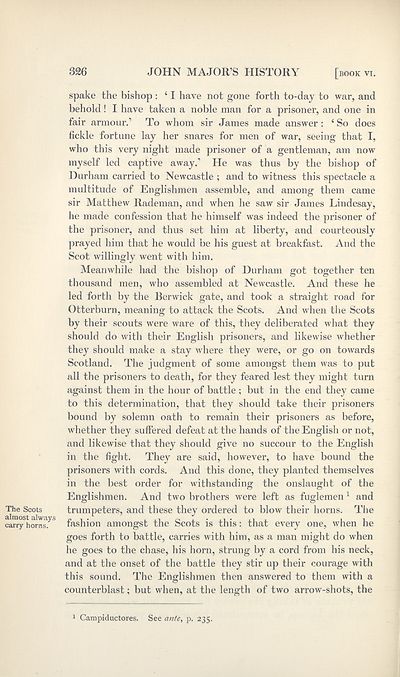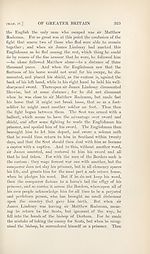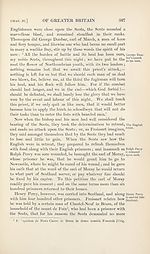Series 1 > History of Greater Britain, as well England as Scotland
(471) Page 326
Download files
Complete book:
Individual page:
Thumbnail gallery: Grid view | List view

The Scots
almost always
carry horns.
326 JOHN MAJOR’S HISTORY [book vi.
spake the bishop : ‘ I have not gone forth to-day to war, and
behold ! I have taken a noble man for a prisoner, and one in
fair armour.’ To whom sir James made answer: 4 So does
fickle fortune lay her snares for men of war, seeing that I,
who this very night made prisoner of a gentleman, am now
myself led captive away.’ He was thus by the bishop of
Durham carried to Newcastle ; and to witness this spectacle a
multitude of Englishmen assemble, and among them came
sir Matthew Rademan, and when he saw sir James Lindesay,
he made confession that he himself was indeed the prisoner of
the prisoner, and thus set him at liberty, and courteously
])rayed him that he would be his guest at breakfast. And the
Scot willingly went with him.
Meanwhile had the bishop of Durham got together ten
thousand men, who assembled at Newcastle. And these he
led forth by the Berwick gate, and took a straight road for
Otterburn, meaning to attack the Scots. And when the Scots
by their scouts were ware of this, they deliberated what they
should do with their English prisoners, and likewise whether
they should make a stay where they were, or go on towards
Scotland. The judgment of some amongst them was to put
all the prisoners to death, for they feared lest they might turn
against them in the hour of battle; but in the end they came
to this determination, that they should take their prisoners
bound by solemn oath to remain their prisoners as before,
whether they suffered defeat at the hands of the English or not,
and likewise that they should give no succour to the English
in the fight. They are said, however, to have bound the
prisoners with cords. And this done, they planted themselves
in the best order for withstanding the onslaught of the
Englishmen. And two brothers were left as fuglemen 1 and
trumpeters, and these they ordered to blow their horns. The
fashion amongst the Scots is this: that every one, when he
goes forth to battle, carries with him, as a man might do when
he goes to the chase, his horn, strung by a cord from his neck,
and at the onset of the battle they stir up their courage with
this sound. The Englishmen then answered to them with a
counterblast; but when, at the length of two arrow-shots, the
Campiductores. See ante, p. 235.
almost always
carry horns.
326 JOHN MAJOR’S HISTORY [book vi.
spake the bishop : ‘ I have not gone forth to-day to war, and
behold ! I have taken a noble man for a prisoner, and one in
fair armour.’ To whom sir James made answer: 4 So does
fickle fortune lay her snares for men of war, seeing that I,
who this very night made prisoner of a gentleman, am now
myself led captive away.’ He was thus by the bishop of
Durham carried to Newcastle ; and to witness this spectacle a
multitude of Englishmen assemble, and among them came
sir Matthew Rademan, and when he saw sir James Lindesay,
he made confession that he himself was indeed the prisoner of
the prisoner, and thus set him at liberty, and courteously
])rayed him that he would be his guest at breakfast. And the
Scot willingly went with him.
Meanwhile had the bishop of Durham got together ten
thousand men, who assembled at Newcastle. And these he
led forth by the Berwick gate, and took a straight road for
Otterburn, meaning to attack the Scots. And when the Scots
by their scouts were ware of this, they deliberated what they
should do with their English prisoners, and likewise whether
they should make a stay where they were, or go on towards
Scotland. The judgment of some amongst them was to put
all the prisoners to death, for they feared lest they might turn
against them in the hour of battle; but in the end they came
to this determination, that they should take their prisoners
bound by solemn oath to remain their prisoners as before,
whether they suffered defeat at the hands of the English or not,
and likewise that they should give no succour to the English
in the fight. They are said, however, to have bound the
prisoners with cords. And this done, they planted themselves
in the best order for withstanding the onslaught of the
Englishmen. And two brothers were left as fuglemen 1 and
trumpeters, and these they ordered to blow their horns. The
fashion amongst the Scots is this: that every one, when he
goes forth to battle, carries with him, as a man might do when
he goes to the chase, his horn, strung by a cord from his neck,
and at the onset of the battle they stir up their courage with
this sound. The Englishmen then answered to them with a
counterblast; but when, at the length of two arrow-shots, the
Campiductores. See ante, p. 235.
Set display mode to:
![]() Universal Viewer |
Universal Viewer | ![]() Mirador |
Large image | Transcription
Mirador |
Large image | Transcription
Images and transcriptions on this page, including medium image downloads, may be used under the Creative Commons Attribution 4.0 International Licence unless otherwise stated. ![]()
| Scottish History Society volumes > Series 1 > History of Greater Britain, as well England as Scotland > (471) Page 326 |
|---|
| Permanent URL | https://digital.nls.uk/127737417 |
|---|
| Attribution and copyright: |
|
|---|
| Description | Over 180 volumes, published by the Scottish History Society, containing original sources on Scotland's history and people. With a wide range of subjects, the books collectively cover all periods from the 12th to 20th centuries, and reflect changing trends in Scottish history. Sources are accompanied by scholarly interpretation, references and bibliographies. Volumes are usually published annually, and more digitised volumes will be added as they become available. |
|---|


